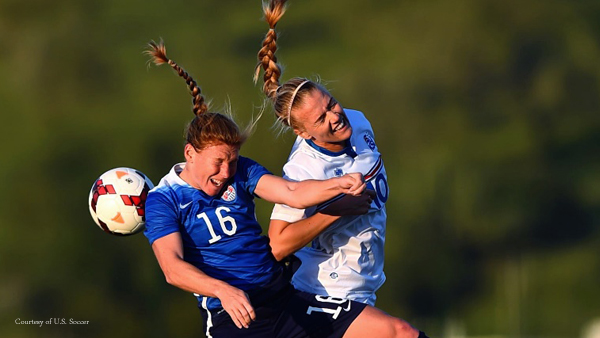Collisions Everywhere: Are referees doing enough to keep female players safe?

 Some injuries we can’t prevent, or can we?
Some injuries we can’t prevent, or can we?
It’s the reason I love to watch soccer and have a very hard time watching rugby or grid iron football. There’s just something about a game whose intention is to “break tackles” or to hit as hard as possible that rubs me the wrong way. I’m in the ‘injury prevention’ business; intent to injure just doesn’t seem sporting.
But injuries surely are a part of our sport. “If you can’t get the ball, get the player,” said the female announcer in an early round World Cup match. (ankle tackle)
Aren’t there rules against that sort of thing? But when the World Cup is at stake, players seem to stretch the definition of those rules. When they play to what they can get away with, things get very physical. And by that, it seems to me, violent.
“At the higher levels, we let the players play more,” an experienced referee shared with me, “because they can play through it.” What he tells me makes sense. What sends a U9 sprawling, shouldn’t disrupt an advanced player, so we let it go. Unless they “give up,” a.k.a. dive. They don’t get that call, unless it goes against them, for embellishment.
The thing is, women don’t dive – at least not much. We play on, in spite of injury. It’s the oddest thing about the “weaker sex,” we make up what we lack in size and strength by playing machismo. If the other girl doesn’t go down, we don’t either. A bump on the head, growing goose egg under our eye, blood dripping from your forehead, no matter. We set aside concern until after we’ve taken care of business.
Which makes it slightly problematic to make the call based on “they can play through it.” Taken literally, it would mean that the “tougher” team is held to higher standard than the “softer” team.
+Read: LeBolt: Is the USWNT too old to win a Women’s World Cup?
Now, I know my refereeing friend, a Level 7 with more than 14 years in the business, did not mean to imply this. But soccer is a contact sport that seems to have morphed into a collision sport, at least on the women’s side. Young players are watching these girls launch themselves at each other at point blank range and figuring that’s how the game is played.
It takes great skill and timing to slide tackle the ball away without bashing the ankle. And women, with less power and quickness than men, are longer on the ball and slower to get rid of it; if not a sitting duck, then a moving duck. Their decisions often come a split second too late for safety. Their passes, when not perfectly timed, mean their second touch is a tackle. And with everything on the line, desperation often incites recklessness.
If we want to protect them from injury, especially reckless physical injury, what can we do? My question: Shouldn’t the referee be our first line of defense?
“I’d like to see yellow cards earlier… and better game management,” my friend says.
“A good referee does her homework. Knows the teams, know the players and their tendencies. She’s communicating the whole game to avoid giving cards, hearing out the players and letting them know when they are close to transgression.”
We’ve seen this quite a bit in the scuffles which seem to erupt in the box on corner kicks, two players called over to get a talking to. Knock it off. I see you. I’ve had enough. That allows the ref to avoid having to make a game-changing decision about a possible penalty after the ball has been played in from the corner.
So, how does he think these World Cup refs are doing?
“Well, they’re making us local refs look good,” he says, only half-kidding, citing the two offside plays that went for goals in the Thailand game. But this pool of referees is broad, he explains. They have recruited them from all the countries represented in the Cup and most aren’t used to officiating high level games. If they wanted the best refs, they would probably look to the top level European leagues where they have experience calling these kinds of games.
Hey, even if you know the rules, experience teaches you how you enforce them. Attitude is key and commanding respect doesn’t come naturally – especially for women. The non-verbal and cultural overtones are everywhere. Game management or attitude?
So, what about that ball in the box that ricocheted off Sydney Leroux’s elbow?
My friend the ref deferred on that one, saying he hadn’t actually watched the game. (Imagine!) But he was clear on the rule and the interpretation a referee makes in the women’s game. Sometimes women naturally hold their arms out further to maintain their balance, but if they make themselves bigger to play the ball to advantage, that’s handling. He’d award the penalty.
I love the way experienced referees see things in black and white. If women want the best for their game, why are we insisting only women ref our World Cup?











